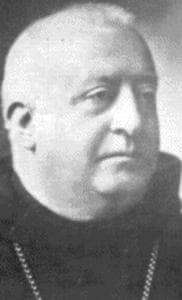
Blessed Columba Marmion
Blessed
Feast Day: January 30
Birth: April 1, 57
Death: January 30, 1923
Biography
Blessed Columba Marmion, also known as Joseph Marmion and Joseph Aloysius Marmion, was born on April 1, 1858, in Dublin, Ireland. He was the son of an Irish father, William Marmion, and a French mother, Herminie Cordier. In 1874, Marmion entered the seminary in Dublin and continued his studies at the College for the Propagation of the Faith in Rome, Italy, from 1876.
On June 16, 1881, Marmion was ordained as a priest in Rome. He initially had aspirations of becoming a missionary monk in Australia, but instead served as a parish priest in Dublin for several years. During his time in Dublin, he held positions as a curate in Dundrum and as a professor at the seminary at Clonliffe. He also served as a chaplain and spiritual director for a Redemptorist convent and a women's prison.
In 1886, Marmion made a significant life decision and renounced his promising ecclesiastical career. He entered the Benedictine Abbey of Maredsous in Belgium, where he took on the name Columba. Despite being almost 30 years old at the time and needing to learn a new language, he persevered and made his solemn profession on February 10, 1891.
Marmion played a pivotal role in the establishment of the abbey of Mont César in Leuven, Belgium. He served as its prior, spiritual director, and professor of theology and philosophy to younger monks. He also began preaching retreats in Belgium and Britain and acted as a spiritual director for communities of Carmelite nuns. Additionally, he contributed to various publications as a researcher and editor, including Revue Bénédictine.
On September 28, 1909, Marmion was elected as the abbot of Maredsous, a position he held until his death. During his time as abbot, Maredsous became renowned not only for its beer and cheese but also for being a center of spiritual thinking in Europe. Marmion actively worked towards the union of Anglican Benedictine houses with Rome, and he even assisted a group of Anglican monks who converted to Catholicism.
Marmion also had the privilege of serving as a counselor to Queen Elisabeth of Belgium during his time as abbot. However, his abbey faced immense challenges during World War I, as it was severely affected by the conflict. The German lay-brothers, who had resided at the abbey, were expelled from Belgium. Marmion sent young monks to study in Ireland for their safety, while he and the remaining brothers had to shoulder increased responsibilities.
After the war, a group of the brothers were sent to the Monastery of the Dormition in Jerusalem, which had been left nearly deserted when the British expelled German monks. Despite the tumultuous times, Marmion continued to preach retreats, guide those in need, and write extensively.
The investigation for the Cause of Blessed Columba Marmion began on February 7, 1957, and one of the miracles attributed to him was the healing of a woman in Minnesota in 1966 through his intercession. He is venerated by the Catholic Church, and Pope John Paul II beatified him on September 3, 2000, at Saint Peter's Basilica in Rome.
Blessed Columba Marmion passed away on January 30, 1923, at Maredsous Abbey in Denée, Namur, Belgium, due to influenza. His feast days are celebrated on January 30 and, on some calendars, October 3. His life and teachings continue to inspire many as he is recognized as a holy figure within the Catholic faith.